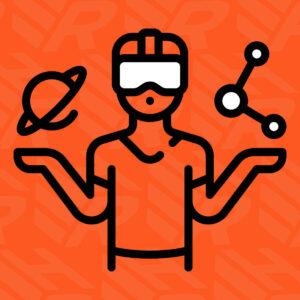 These days, you’d be hard pressed to find someone who hadn’t heard about the Metaverse. In fact, it’s been two years since Zuckerberg rebranded to ‘Meta’ so he could focus on building a three-dimensional virtual reality. But what’s new in the Metaverse? And how does it impact HR?
These days, you’d be hard pressed to find someone who hadn’t heard about the Metaverse. In fact, it’s been two years since Zuckerberg rebranded to ‘Meta’ so he could focus on building a three-dimensional virtual reality. But what’s new in the Metaverse? And how does it impact HR?
As big corporates across the globe start to make the move to a digital workplace, we couldn’t help but wonder, what type of spaces could we build? Forget the limitations of bricks and mortar – channel the SIMS game of our youth and let our imagination run free.
Here’s some truly impactful ways businesses like yours could expand the spaces of the workplace when you enter the Metaverse.
Build a better balance
A universe without physical limits creates infinite possibilities for wellbeing. Think big, like soothing spaces built into plush forests, break rooms in underwater paradises, or even a random fun area that houses a bouncy castle on the moon, because why not? This is your opportunity to develop wellness ‘rooms’ your team can really benefit from. Karaoke room, anyone?
Create spaces to socialise
It was reported recently that 53% of remote workers say it’s harder to feel connected to their co-workers due to a lack of in-person interaction. One win for the digital workplace is that you can ‘bump into’ colleagues, just like at the office. So even though teams will technically work remotely, they won’t feel so disconnected after catching up at the virtual watercooler.
Engineer new-age collaboration stations
Tired of trying to collaborate over a 2D video call? Meta sure is. That’s why they created ‘highly realistic 3D avatars’ that mirror body language, so remote meetings will feel like you’re in the same room. They’re still working out the kinks, but promise big things for virtual collaboration. At the least, we’re expecting a place to store handwritten notes in never-wiped-clean white boards, or even avatar-to-avatar high fives over brilliant ideas. Just watch this space.

Microsoft Teams on Meta’s Quest VR headsets. Source: Meta
Make safe spaces for sensitive conversations
Having hard conversations can be tricky, whether you’re in-office or remote. The Metaverse can create private spaces where HR and employees can have sensitive conversations without worry of prying eyes or ears. Some headset functions even allow for this to happen while you’re on the ‘office’ floor. Tech these days, huh?
Create out-of-this-world onboarding spaces
The onboarding experience solidifies a new employee’s decision that moving was the right choice. So forget the welcome PDF and give them an out of this world experience. Throw new recruits a digital party to welcome them into the fold. Or at the very least an onboarding experience they’ll always remember. An improv performance on their first day might be a step too far – or is it?
Develop futuristic training spaces
Some industries, like healthcare, have been using AR/VR training technology for years. But the Metaverse doesn’t have to just be used for technical training roles. Instead, you can train for a number of different role-playing scenarios, like working through customer service interactions, coaching leaders through difficult conversations or even preparing employees for presentations.

Metaverse in the healthcare industry. Source: Cognihab
So this all sounds good, but what should we watch out for?
This type of tech is still in its very early stages, and only a handful of companies are investing in the technology so far. The Harvard Business Review says there’s a few things to remember before the digital workplace roll out begins.
Speed of adoption is important
Large enterprises will need to act fast to keep up with Metaverse technologies and virtual services, or risk losing top talent that want to work where the tech is cutting-edge.
It’s not a tool to control employees
As a short but sharp reminder, HBR says, “The Metaverse will only be successful if it is deployed as a tool for employee engagement and experiences, not for supervision and control.”
It’s not new for the younger generation
Gen Z (1995-2010) and Gen Alpha (2010-2025), while still young, are growing up in this new age of technology. Because of this, HBR says, “Metaverse-based work must match the virtual experiences that workers, particularly younger workers, have come to expect of the technology in their consumer and gaming lives.”
It’s still early days when it comes to digital workplaces. But if you can build spaces to enhance your employee’s experiences – both for work and wellbeing purposes, it’ll be a game-changer for companies looking to retain top talent. So will your business be making the move to the Metaverse anytime soon?

